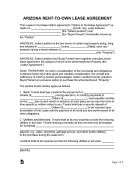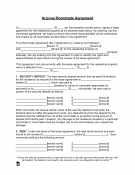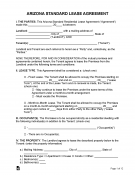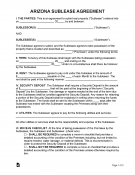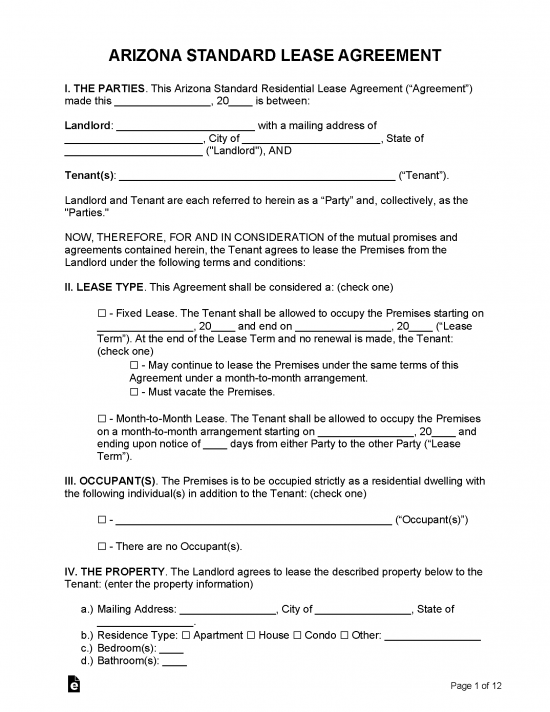Arizona lease agreements are contracts between landlords and tenants that set out the terms of a tenant’s tenure in a property owned by a landlord. The agreement will specify how much the tenant owes in rent and how frequently, and what the landlord is obligated to supply in return. Lease agreements are a way for both landlords and tenants to have a better idea of what is expected of them before entering a lease.
Contents
- Arizona Lease Agreements: By Type (6)
- Landlord-Tenant Laws
- Handbooks and Guides
By Type (6)
- Commercial Lease Agreement
- Month-to-Month Lease Agreement
- Rent-to-Own Lease Agreement
- Roommate Lease Agreement
- Standard Lease Agreement
- Sublease Agreement
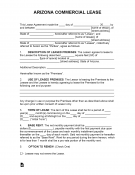 Commercial Lease Agreement
Commercial Lease Agreement
Download: Adobe PDF, MS Word, Rich Text Format
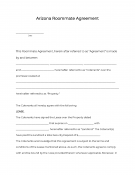 Month-to-Month Lease Agreement
Month-to-Month Lease Agreement
Download: Adobe PDF, MS Word, Rich Text Format
Download: Adobe PDF, MS Word, Rich Text Format
Download: Adobe PDF, MS Word, Rich Text Format
Download: Adobe PDF, MS Word, Rich Text Format
Download: Adobe PDF, MS Word, Rich Text Format
Landlord-Tenant Laws
Statutes – Ariz. Rev. Stat. Title 33, Chapter 10 (Arizona Residential Landlord and Tenant Act)
Required Disclosures (8)
Bed Bugs Disclosure (§ 33-1319) – Landlords are required to give “educational materials” to tenants about how to deal with bedbugs and how they spread.
Fees (§ 33-1321) – Any fee stated in the agreement that is non-refundable must specifically state that it is non-refundable or else the amount is refundable.
Landlord-Tenant Act (§ 33-1322) – The landlord must give the tenant a copy of the Arizona Residential Landlord and Tenant Act (Title 34, Chapter 3) at the time of lease authorization.
Lead-Based Paint Disclosure – Federal law requires all landlords/managers/agents to inform a new tenant that a property may have lead-based paint if built prior to 1978.
Move-in / Move-out Condition Checklist (§ 33-1321(C)) – All leases are required to have the move-in checklist attached. Whether it is completed by the tenant is up to them. At the end of the lease, the landlord will be able to perform the move-out inspection by first giving the Tenant written notice of the move-out date.
Notice (§ 33-1322) – The landlord must disclose the person(s) managing the property and give contact information for any legal notices. This is commonly written in the lease agreement.
Pool Safety Notice (§ 36-1681(E)) – For landlords renting a property with access to a pool.
Shared Utility Charges (§ 33-1314.01) – If the landlord bills the tenant based on a shared meter, the computation for how it is charged must be in the rental contract. The landlord may reimburse themselves for any administrative costs for calculating and paying the utility.
Taxes (§ 33-1314) – If the business pass-through tax changes in the area of the residence, the landlord may reflect the tax with at least thirty (30) days’ notice to the tenant. This option to increase the rent due to the business pass-through tax must be stated in the lease for it to come into effect.
Security Deposit Laws
Maximum Amount ($)
A landlord may charge up to one-and-a-half (1.5) times the monthly rent for a security deposit (§33-1321(B)).
Returning to Tenant
Within fourteen (14) days of the termination of the tenancy, not including Saturdays, Sundays, and legal holidays, the landlord shall provide the tenant with an itemized list of deductions from the security deposit and the amount remaining. If the tenant does not dispute the itemization within 60 days, the landlord’s accounting becomes final (§33-1321(D)).
When is Rent Due? (grace period)
Rent is due on the date the tenant and landlord have agreed on.
If the tenant fails to provide rent, the landlord may terminate a lease within five (5) days of the tenant receiving written notice of an intention to terminate the lease for failure to pay rent (§ 33-1368(B)).
Eviction Notice (non-payment)
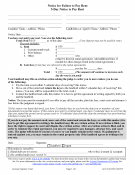 5-Day Notice to Pay or Quit – If the tenant does not pay rent on time the landlord can issue a five (5) day notice to pay or quit. The tenant will have five (5) days to pay the rent in-full (A.R.S. 33-1368(B)).
5-Day Notice to Pay or Quit – If the tenant does not pay rent on time the landlord can issue a five (5) day notice to pay or quit. The tenant will have five (5) days to pay the rent in-full (A.R.S. 33-1368(B)).
Download: Adobe PDF
Maximum Fees ($)
Late Rent Penalties
Fees for late rent must be reasonable and should be stated in the rental agreement (§ 33-1368(B)).
NSF Checks
All payees in Arizona, including landlords, may assess a fee of no more than $25 for providing a check with insufficient funds (§ 44-6852).
Tenant’s Unclaimed Property
If a tenant leaves property behind after an agreed-upon move-out date, a landlord need only take reasonable care of belongings that might accidentally have been left behind. If a tenant abandons a property or is evicted, the landlord should take a written inventory of personal property left behind and attempt to notify the tenant.
The landlord has no obligation to care for perishable items, such as houseplants, but should take reasonable care in storing other property, in a location of the landlord’s choosing, for fourteen (14) days after retaking possession.
After fourteen (14) days, the landlord may donate the left-behind property to a qualifying charity, or sell the goods and apply the proceeds to any outstanding balance owed by the tenant; if selling, the landlord must attempt to return any balance to the tenant at the tenant’s last known address.
Tenants may obtain access to certain goods while they are in storage even without paying any owed balance, including clothing, personal and financial documents, and tools or books related to employment (§ 33-1370(F)).
